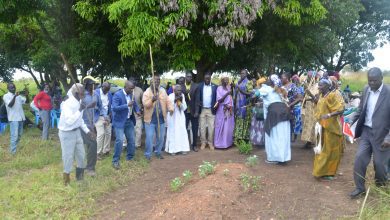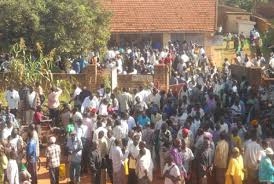Politics
UGANDA: WORLD FOOD PROGRAMMES WILL SOON RUNOUT OF FOOD SUPPLY- HEAD OF FILED OFFICER ARGUES.
.
The population for refugee seeking asylum from South Sudan are increasing everyday raising fear by UN-agency WFP about possible food supply shortages to the people. Uganda is hosting about 1.2 million refugees currently.
GULU-UAGNDA: During the first ever Agri-enterpreneurship symposium was held at Gulu University in Gulu town recently under the theme: “Role of higher-education and private sector in enhancing Agri-enterpreneurship program”, Head of Filed Office World Food Programmes raised the concern.
Tom Ahimbisibwe Bamwiseki, says they are worried that as drought threatens the Great Lakes Region which delayed the onset first season planting of crops by early March, food supply will be inadequate for the south Sudan refugee.
“Currently refugees are depending on food from hand to mouth and by August we don’t know if we can give the food to the people. That’s why we are actualizing research promising on agriculture in Gulu.” Ahimbisbwe argued.” Ahimbisibwe says
Currently WFP is spending a total of Uganda shilling 3.4billion monthly to feed about 1.2 million people, although the WFP official says new arrival from South Sudan to Uganda especially from Lukung border in Lamwo district stands at daily record of about 200 people.
He argued that Northern Uganda is likely to face outbreak of hunger because of the massive trees cutting for charcoal and loggings which affected the normal rainfall distribution, a factor Ahimbisibwe says Government is to blame for not stopping.
The two days symposium was took place on 5th and 6th June 2019 was attended by experts, students, stakeholders and political leaders within and outside Gulu District, representative of refugees and host community of Adjumani district to discuss way forward for coexistence between refugees and host Communities in Northern Uganda.
Prof. Dancan Ongeng Dean Faculty of Agriculture, Gulu University explore the good work being done through enhancing Agriculture in the course of Community outreach using with youths in the community.
He says global youth population is about 1.3 billion arguing that youth still dominates in developing country economy by bridging gaps of workforce.
Prof. Ongeng attributed that Universities in African are developed to ‘Ivory Tower business community’ that is to End User.
“We have to deal with relevant and also participate in community outreach programs that empower our people.” Prof Ongeng commented.
“We welcome international initiative that students equip with skills in Agribusiness and micro enterprise development to help them becomes financially independent. The programmes are a win-win situation to two common challenges in Africa how to develop skills among student how to prepare them to contribute to agriculture and food security.” Prof Ongeng reasoned.
Gulu University has three outreach areas like Bobi Vocational Institute, Community in Labora and Adjumani Refugee settlement as noted by Prof Ongeng.
He further explain that Gulu University is building capacity of community for money minded, the MP for Gulu Municipality was here and we told her that over hitching development here on the University, how to enable Community benefit and the refugees who are among the world most vulnerable resource-starved communities, and local people to earn an income and help supply food and to their peers.
“I see that the good things that has been done in Africa, has been done in the faculty of medicine, they have done a lot in the research, the research was done at St Mary Hospital Lacor, we see that we are going to organize the same here in the faculty of Agriculture.” Prof. Ongeng noted.
The professor says Gulu University is developing training methodology and curriculum for to be funded to help in community transformation through agribusiness.
Gulu University is one of the two African Universities implementing the community transformation agricultural project with the goal to make a development.
Among beneficiaries of the Gulu University agricultural project include; VET, Hoima refugee and Kiryadongo refugee settlements, Labora and Bobi Polytechnic.
Students training refugees
Gulu University is a role model, students training in turn they used the skills and knowledge acquired from University to train refugees, about(423 in the past years)in Northern Uganda and more from most communities that could help them earn an income and potentially transform their lives.
Adjumani Refugees settlement camps is one of the case study, during the symposium two girls presented their product being widely planted by refugees.
Ends






